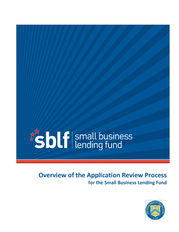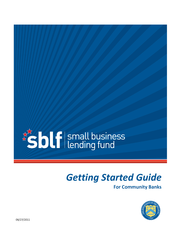Description
repaying the funding provided along with any accrued
dividends.
Application Process
If your institution wants to apply to participate in the Small
Business Lending Fund, it must submit an application to
Treasury at SBLFApps@treasury.gov.
The application form is available on the Small Business
Lending Fund website at www.treasury.gov/SBLF. The
application deadline for C Corporation banks is May 16,
2011. Treasury encourages eligible institutions to submit
their application as soon as possible to allow sufficient time
for processing.
In addition to the application, your institution must submit
a small business lending plan of approximately two pages in
length to its primary federal regulator and to its state
regulator, if applicable. Also, please note that the lending
plan should not be sent to Treasury.
(Your institution’s regulator will forward it to Treasury.) Eligibility An insured depository institution is eligible if it has assets of less than $10 billion and it meets the other requirements for participation. If the institution is controlled by a holding company, the combined assets of the holding company determine eligibility. Community development loan funds are also eligible. Mutual Institutions, Subchapter S Corporations, and Community Development Loan Funds Treasury is developing terms and guidance for mutual institutions, Subchapter S corporations, and community development loan funds.
Terms for such institutions may vary from those described in this document, and separate application dates will apply for these institutions. Banks that have total assets of $1 billion or less may apply for SBLF funding that equals up to 5% of risk-weighted assets. Banks that have assets of more than $1 billion, but less than $10 billion may apply for SBLF funding that equals up to 3% of risk-weighted assets. Additional Information To learn more, visit the Small Business Lending Fund website at www.treasury.gov/SBLF or make contact in one of the three ways shown below. The Small Business Lending Fund also provides an option for eligible community banks to refinance preferred stock issued to the Treasury through the Capital Purchase Program (CPP) or the Community Development Capital Initiative (CDCI) under certain conditions. For general inquiries and questions, please call the Small Business Lending Fund information line at 888-832-1147. For communications pertaining to a specific institution, please email SBLFInstitutions@treasury.gov, a Treasury email address. An institution is not eligible if it is on the FDIC’s problem bank list (or similar list) or has been removed from that list in the previous 90 days. Generally, this will include any bank with a composite CAMELS rating of 4 or 5. For media inquiries, please call the U.S.
Department of the Treasury Press Office at 202-622-2960. Repayments With the approval of its regulator, an institution may exit the Small Business Lending Fund at any time simply by (revised 03/28/11) 2 .
(Your institution’s regulator will forward it to Treasury.) Eligibility An insured depository institution is eligible if it has assets of less than $10 billion and it meets the other requirements for participation. If the institution is controlled by a holding company, the combined assets of the holding company determine eligibility. Community development loan funds are also eligible. Mutual Institutions, Subchapter S Corporations, and Community Development Loan Funds Treasury is developing terms and guidance for mutual institutions, Subchapter S corporations, and community development loan funds.
Terms for such institutions may vary from those described in this document, and separate application dates will apply for these institutions. Banks that have total assets of $1 billion or less may apply for SBLF funding that equals up to 5% of risk-weighted assets. Banks that have assets of more than $1 billion, but less than $10 billion may apply for SBLF funding that equals up to 3% of risk-weighted assets. Additional Information To learn more, visit the Small Business Lending Fund website at www.treasury.gov/SBLF or make contact in one of the three ways shown below. The Small Business Lending Fund also provides an option for eligible community banks to refinance preferred stock issued to the Treasury through the Capital Purchase Program (CPP) or the Community Development Capital Initiative (CDCI) under certain conditions. For general inquiries and questions, please call the Small Business Lending Fund information line at 888-832-1147. For communications pertaining to a specific institution, please email SBLFInstitutions@treasury.gov, a Treasury email address. An institution is not eligible if it is on the FDIC’s problem bank list (or similar list) or has been removed from that list in the previous 90 days. Generally, this will include any bank with a composite CAMELS rating of 4 or 5. For media inquiries, please call the U.S.
Department of the Treasury Press Office at 202-622-2960. Repayments With the approval of its regulator, an institution may exit the Small Business Lending Fund at any time simply by (revised 03/28/11) 2 .









